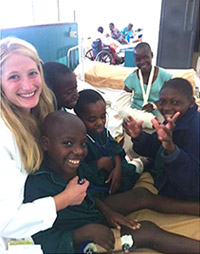Improving Anesthesia in Rwanda, with Passion and Patience

Emily Nelson visits one of the wards
at Butaro Hospital, Rwanda. |
Barefoot farming injuries and falls from avocado trees
quickly became part of the clinical landscape for Emily Nelson, MD, when she
left the Brigham for Butaro Hospital in rural Rwanda.
An attending anesthesiologist at BWH, Nelson discussed her
experiences at the "Brigham Global Anesthesia Hour" on March 6. Nelson and husband Josh Lamb, MD, an orthopedic
surgeon at Beth Israel Deaconess Medical Center, spent October 2011-October
2012 with Partners In Health working at Butaro Hospital, located in northern
Rwanda by the Ugandan border. Rwanda has a critical shortage of healthcare
providers--the entire country has only 13 anesthesiologists, in contrast with
more than 140 at BWH alone, and rates of avoidable anesthesia-related deaths
are 100 to 1000 times higher in developing countries such as Rwanda.
Working at Butaro Hospital was an exciting way for Nelson to
learn about a new part of the world as well as give back to it. "I didn't know
exactly what my role would be," said Nelson. "I was taught that to be most effective in
global health, one should watch and listen and adopt the role most needed by
local care providers."
At Butaro, Nelson's projects included creating a system to
ensure oxygen availability and teaching nurses about monitoring patients for
post-surgical complications. "Some of
these projects may seem quite basic, or like projects that could be
accomplished in a few days," Nelson said. "That's what I thought, until I tried
to start implementing them!"
Among Nelson's most well-received projects was introducing
nerve blocks, which involve injecting a local anesthetic near a nerve in order
to eliminate feeling in a particular part of the body. Nerve blocks quickly
became a popular form of anesthesia at Butaro. Nelson found patients often had
a fear of general anesthesia and concerns that their limbs would be amputated
or they would pass away while they were unconscious. Being conscious during an
operation reduced their fear. Nerve blocks also allowed patients to continue
breathing unassisted, so clinicians at Butaro did not have to place breathing
tubes or manage the patient's breathing, making regional anesthesia safer in
this setting.

One of Emily Nelson’s goals was to teach new
anesthesia techniques to local clinicians. |
When Nelson first arrived, one project she contemplated was
providing pain relief for childbirth. But she ultimately abandoned the idea
after observing that Rwandan women in labor were very stoic, and patients and
health care providers she spoke with showed little interest in this service. An
important lesson Nelson learned during her time at Butaro was to focus her
energy on projects local staff identified as priorities, as this ensured
support and increased the likelihood of success.
"Health care
professionals can do great work on short-term projects," said Nelson. "I feel
like I am a much better anesthesiologist after my time in Rwanda. I came home
with better clinical skills in areas like physical exams and resuscitation, and
being in such a different environment encouraged me to develop my creativity and
flexibility. I gained a new perspective on death and dying thanks to my Rwandan
colleagues, and I deeply admire the care they provided to patients. There are people all over the world with no
access to life-saving surgical procedures.
I am fortunate I had the opportunity to help, and thankful for
everything I learned while I was in Rwanda."